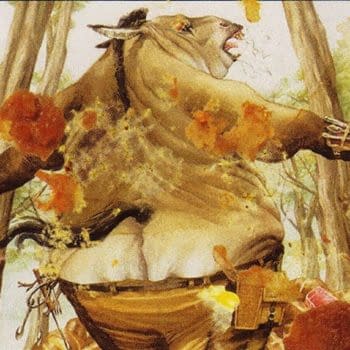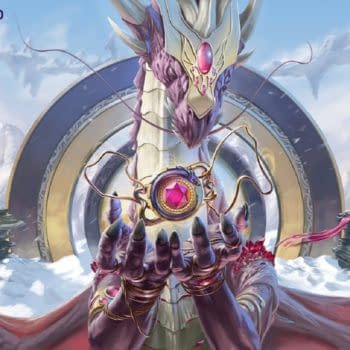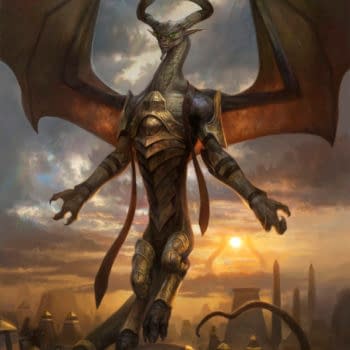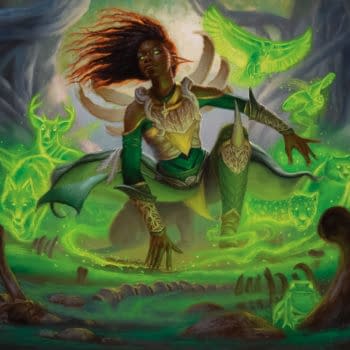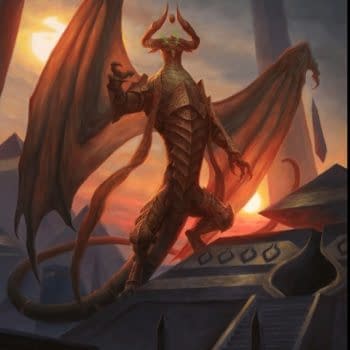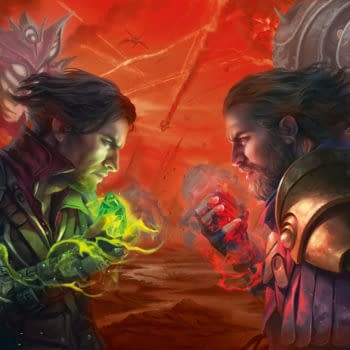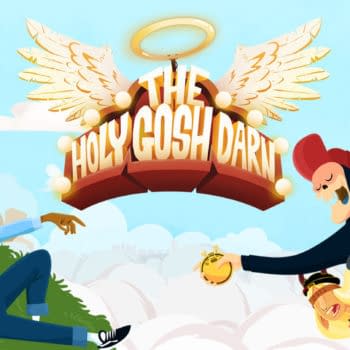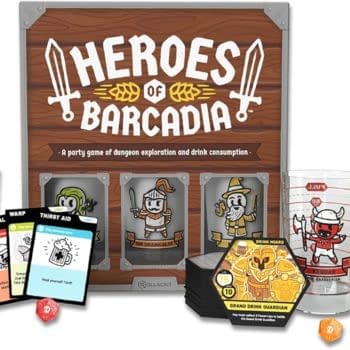Posted in: Games, Role Playing Games, Tabletop | Tagged: interview, Loresmyth, Remarkable Cults
Interview: Remarkable Cults Kickstarter Launches March 4th
Loresmyth, a small yet impactful indie publisher of tabletop role-playing game supplementals, is launching their next upcoming supplemental book, Remarkable Cults, on March 4th! We got the chance to conduct an interview with Chris Mahon, Product Development Manager for Loresmyth, about the Remarkable Cults project for your reading pleasure.
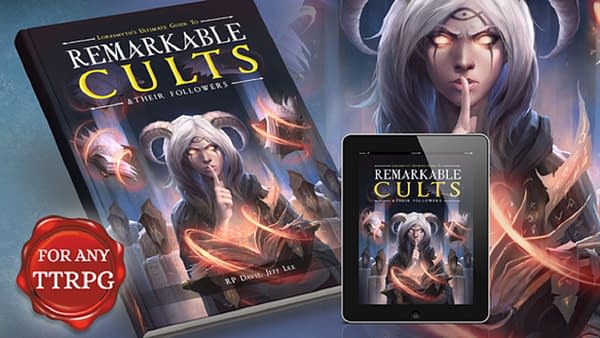
Bleeding Cool: What made you decide to create this book? Roughly how many people expressed immediate interest in this idea when gauging for it?
Chris Mahon: One of our goals with our books is to re-infuse run-of-the-mill parts of RPGs (like visiting an inn or traveling through the wilderness) with that sense of wonder or danger that we look for in fantasy. Chris van der Linden, our Creative Director, wanted to do something new with the Remarkable series, and we thought covering villains would be exciting.
We poll our customers pretty regularly about what products they want to see next! We got over 600 responses to our survey on what the next Remarkable book should be, and "Villains" was among the top picks. As of writing this, the project's pre-launch page has almost 1300 followers on Kickstarter!
BC: Because your book is a book that can be used to craft villainous campaigns, did you design any enemy NPCs, and if so, how did you go about it? Are there any hostile "heroes" in this book to face off against?
CM: Yeah! We made sure each of the pre-built factions has some custom NPCs with their own backstory and role. For the leaders, we go a little deeper—we focus on their motivations, their goals for the organization, and their personality. We really wanted to make the leaders engaging to roleplay and more complex to understand than "they want world domination" or "they're megalomaniacal psychopaths."
An example is the leader of Nox Libris, a tiefling scholar who's built an order devoted to collecting forbidden knowledge and lore. She's cold and pragmatic, but she's not malevolent—she sees preserving knowledge as more valuable than labeling and suppressing it as evil. Still, she's definitely dangerous…
BC: According to Forbes, there was recently a shift from Wizards of the Coast to omit the stereotypes of "evil races" for the sake of those who objected to the other-ism of the concept. Will we be seeing any alternative rules in this book for races that have succumbed to evil by choice?
CM: We don't have any special racial rules for becoming evil, since in our view, becoming 'evil' isn't something that you can really quantify—you can be selfish, destructive, hateful, or cruel, but those are all points of view.
I think the character on the cover of the book pretty much sums up our answer: she's got frightening eyes, she's surrounded by hooded followers, and she's got horns. The immediate assumption might be that she's evil, but once you read about her, you realize her ideals are familiar: truth, freedom from dogma, and knowledge.
BC: Being a Dungeon Master working with a villain campaign myself already, what can I expect to gather from this book that I wouldn't expect to see in typical supplemental RPG content? How about compared to content that deals more specifically in evil campaigns?
CM: When it comes to our Remarkable series, we focus more on storytelling and worldbuilding tools than gameplay mechanics or encounter-building. For example, instead of only having a random table to determine how much money a cult has, we have a whole section on "Wealth & Resources," which explains how a faction might make its money.
In Remarkable Cults, we want to give GMs the tools to create living, breathing factions and NPCs who fit into the larger tapestry of their worldbuilding. A lot of our customers like the pre-made content we include because they can drop it right into their games, but the thing people like most is that our books go beyond the cliches–Cults isn't just a collection of evil, cursed items or just a list of bad guys to fight–it's meant to be a new take on how to approach 'villains' and their organizations.
BC: When deciding upon the title of this supplemental, you went with "Remarkable Cults". Why cults, specifically? Why not something like "Remarkable Renegades" or similar?
CM: You know, it was really difficult to settle on a name. The book covers a lot of organizations that are not cults, but there was something visceral and sinister about the word that immediately evoked 'villains,' especially in the minds of RPG players. We actually have a sequel to Cults planned for next year that will make the name choice make a lot of sense…
BC: What were your two favorite aspects of this book to write?
CM: I'm actually the Product Development Manager–our two writers, Jeff Lee and Bob Davis, handled the bulk of the writing! However, I did do a lot of writing behind the scenes, which was then passed to Jeff and Bob to flesh out..
My favorite part was definitely brainstorming the 8 unique, pre-made factions for the book. Our Creative Director, Chris van der Linden, kept pushing my initial concepts to be more interesting or fantastical. For example, one of the factions started as a cult of dreamers who contact interplanar beings in their dreams, but they turned into a band of magical performers whose theater shows break down the boundary between reality and their audience's fantasies.
My second favorite has to be the briefs for the Wealth & Resources chapter, which covers how different factions make money to carry out their agendas. The previous books, Remarkable Shops and Remarkable Inns, dealt with this stuff on a very small scale, but it was cool to think about how a group of spies funded a large-scale operation without leaving any traces.
BC: What is the nature of evil as dictated by the book? How do you delineate the dichotomy between evil and good? My system currently uses an alternative set of alignment charts modeled after Lorelei Weisel-Librizzi's "color pie"-styled alignments. Do you showcase anything similar to those?
CM: We don't actually have a definition of the nature of evil in the book–the closest thing we have is a section explaining that most of the factions in the book are considered to be 'evil' by most members of society, but that the factions generally see themselves as justified or even good.
Tabletop RPGs love to systematize things (it is a game after all), but morality is a tough thing to categorize, even with really cool and innovative charts. Ultimately, a morality chart reduces someone's worldview to a couple coordinates on a grid, but that's not what PCs see when they come face to face with a vampire sea captain—they see a person. Our aim with Cults is to make those encounters more engaging than 'here is another bad guy. Kill them'.
The goal of Remarkable Cults isn't to say that terms like 'good' and 'evil' are useless, or that all villains are simply misunderstood. Instead, our intent was to make tabletop stories richer by encouraging GMs to re-examine what makes someone a 'villain.'
Characters like Tyrion Lannister have shown how complicated morality can be, and how interesting it can be to create stories where the heroes have to question why they do what they do.
BC: Do you have any tips for readers who wish to distance their evil campaigns from a simple re-skin of more "heroic" campaigns? It always seems like my evil campaigns tend to skew towards heroic by the end (possibly) by no fault of my own.
CM: I think a lot of groups may be playing 'evil' campaigns without realizing it! So many games fall into 'protagonist-centric morality' or devolve into being 'murder hobo' campaigns, where PCs do whatever they want because no one can stop them. However, being consciously 'evil' is different.
I can't really see any group of players playing an 'evil' campaign without believing, on some level, that what they're doing is justified. In that sense, it's a blurry line between a heroic or evil campaign.
However, I will say this: players often struggle with roleplaying self-consciously 'evil' characters long-term, because 'evil' characters are rarely ever at peace with themselves.
For example, I once played as a Lawful Evil necromancer named Wicker. By the end of the campaign, my character had abandoned his in-game friends, spent countless sessions anxiously watching his schemes unfold, and sacrificed everything in pursuit of power. And he got away with it—he became a dark god. But it wasn't a happy ending, because I (and the character) discovered that ultimate power didn't fill the void left by obtaining it.
BC: Finally, do you have any pointers for those looking to write and/or publish their own systems or supplementals for public use?
CM: Everyone comes to the table for different reasons (if Bartle's Taxonomy is even half correct)—some people want to kill stuff, and other people want to dig into the lore. However, we've found that one of the most valuable things we can do is help a GM set the stage for a great story and an immersive world.
According to Chris van Der Linden, his best advice would be "to 'start' and start small, so you finish something and publish it. This is the only way to learn going from an idea to creation and publication. Many think about wanting to do something, but simply never start."
For me, if you're going to write your own RPG content, don't treat your narrative as a series of boxes to check or worldbuilding as window-dressing. Even the most rudimentary storytelling techniques, like foreshadowing a horrifying plot point, can be really effective for making the player experience memorable.
The Kickstarter for Remarkable Cults launches on March 4th of this year. What do you think? Are you excited for this supplemental RPG material? Let us know in the comments below!


